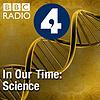
In Our Time: Science
BBC Radio 4
Categories: Education
Listen to the last episode:
Melvyn Bragg and guests discuss the tantalising idea that there are shortcuts between distant galaxies, somewhere out there in the universe. The idea emerged in the context of Einstein's theories and the challenge has been not so much to prove their unlikely existence as to show why they ought to be impossible. The universe would have to folded back on itself in places, and there would have to be something to make the wormholes and then to keep them open. But is there anywhere in the vast universe like that? Could there be holes that we or more advanced civilisations might travel through, from one galaxy to another and, if not, why not?
With
Toby Wiseman Professor of Theoretical Physics at Imperial College London
Katy Clough Senior Lecturer in Mathematics at Queen Mary, University of London
And
Andrew Pontzen Professor of Cosmology at Durham University
Producer: Simon Tillotson
Reading list:
Jim Al-Khalili, Black Holes, Wormholes and Time Machines (Taylor & Francis, 1999)
Andrew Pontzen, The Universe in a Box: Simulations and the Quest to Code the Cosmos (Riverhead Books, 2023)
Claudia de Rham, The Beauty of Falling: A Life in Pursuit of Gravity (Princeton University Press, 2024)
Carl Sagan, Contact (Simon and Schuster, 1985)
Kip Thorne, Black Holes & Time Warps: Einstein's Outrageous Legacy (W. W. Norton & Company, 1994)
Kip Thorne, Science of Interstellar (W. W. Norton & Company, 2014)
Matt Visser, Lorentzian Wormholes: From Einstein to Hawking (American Institute of Physics Melville, NY, 1996)
In Our Time is a BBC Studios Audio Production
Previous episodes
-
288 - WormholesThu, 24 Oct 2024
-
287 - BacteriophagesThu, 01 Aug 2024
-
286 - MercuryThu, 30 May 2024
-
285 - Nikola TeslaThu, 02 May 2024
-
284 - JupiterThu, 27 Jul 2023
-
283 - HormonesThu, 07 Mar 2024
-
282 - Heisenberg's Uncertainty PrincipleThu, 28 Mar 2024
-
281 - PlanktonThu, 02 Nov 2023
-
280 - Albert EinsteinThu, 12 Oct 2023
-
279 - MitochondriaThu, 29 Jun 2023
-
278 - LinnaeusThu, 18 May 2023
-
277 - Paul ErdősThu, 23 Mar 2023
-
276 - Tycho BraheThu, 02 Mar 2023
-
275 - SuperconductivityThu, 23 Feb 2023
-
274 - The Challenger Expedition 1872-1876Thu, 22 Dec 2022
-
273 - The Fish-Tetrapod TransitionThu, 17 Nov 2022
-
272 - The ElectronThu, 27 Oct 2022
-
271 - The Death of StarsThu, 07 Jul 2022
-
270 - Homo erectusThu, 12 May 2022
-
269 - SeismologyThu, 07 Apr 2022
-
268 - In Our Time is now first on BBC SoundsFri, 04 Mar 2022
-
267 - William and Caroline HerschelThu, 11 Nov 2021
-
266 - CoralsThu, 28 Oct 2021
-
265 - The Manhattan ProjectThu, 07 Oct 2021
-
264 - The Evolution of CrocodilesThu, 16 Sep 2021
-
263 - LongitudeThu, 13 May 2021
-
262 - Pierre-Simon LaplaceThu, 08 Apr 2021
-
261 - The Late Devonian ExtinctionThu, 11 Mar 2021
-
260 - Emilie du ChâteletThu, 04 Feb 2021
-
259 - EclipsesThu, 31 Dec 2020
-
258 - Alan TuringThu, 15 Oct 2020
-
257 - Paul DiracThu, 05 Mar 2020
-
256 - The Evolution of HorsesThu, 27 Feb 2020
-
255 - Solar WindThu, 23 Jan 2020
-
254 - HybridsThu, 31 Oct 2019
-
253 - Dorothy HodgkinThu, 03 Oct 2019
-
252 - Kinetic TheoryThu, 23 May 2019
-
250 - The Evolution of TeethThu, 11 Apr 2019
-
249 - PheromonesThu, 21 Feb 2019
-
248 - Aristotle's BiologyThu, 07 Feb 2019
-
247 - Emmy NoetherThu, 24 Jan 2019
-
246 - VenusThu, 27 Dec 2018
-
245 - Free RadicalsThu, 01 Nov 2018
-
244 - AutomataThu, 20 Sep 2018
-
243 - EcholocationThu, 21 Jun 2018
-
242 - The ProtonThu, 26 Apr 2018
-
241 - George and Robert StephensonThu, 12 Apr 2018
-
240 - Rosalind FranklinThu, 22 Feb 2018
-
239 - FungiThu, 15 Feb 2018
-
238 - CephalopodsThu, 01 Feb 2018























